Eating healthy is essential to ensure that you are healthy and fit. While most of us set an intention to eat healthy, in the hustle and bustle, we all end up munching on our so-called favorite foods. All the foods from nature are superfoods, and they are named as rich treasure troves of various nutrients. Here are the ten best foods you should include in your daily diet.
Top 10 Foods to Include In Your Daily Diet
1. Flax seeds
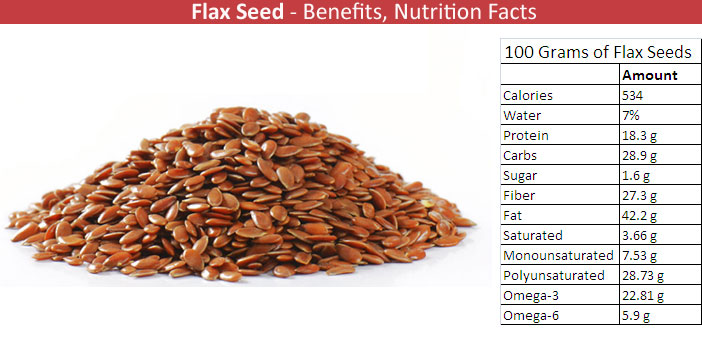
Flax seeds are rich sources of omega-3 fatty acids, Alpha Linoleic Acid. They are also an easy way for vegetarians to get a good dose of fiber. One tablespoon grounded flax seed yields 2.3 grams of fiber. Along with fiber, these contain minerals and vitamins like vitamin B1 and manganese. Linseeds, as they are also known, are the treasure troves of various other micronutrients and antioxidants that help shield your heart, prevent cancer, and lower the risk of obesity and diabetes. Just sprinkle it atop your yogurt or salad.
How to Eat: 1 tablespoon of Flax seeds is enough to meet the body’s daily requirements. Taking it in powdered form rather than as a whole is advisable. Sprinkle 1 tbl of the powder in your regular food during the day. The seeds have a crunchy top, so the nutritional benefits might only be gained once appropriately chewed. One could soak it overnight if one needs to take it whole to overcome this.
Benefits of Flax seeds:
- Cholesterol – Good for heart as they are free from cholesterol
- Digestion – Helps in digestion, rich in fiber, relieves constipation
- Weight Loss – Delays hunger and aids in weight loss
- Antioxidants – Lignans present in the seeds are antioxidants which help in regulating hormonal levels in women
- Hair Loss – Hormone DHT in men is one of the major causes of men’s hair fall. Lignan present in Flax seeds prevents the formation of an enzyme that transforms testosterone to DHT
- Prostate – Lower DHT also helps in keeping healthy prostate
2. Oats
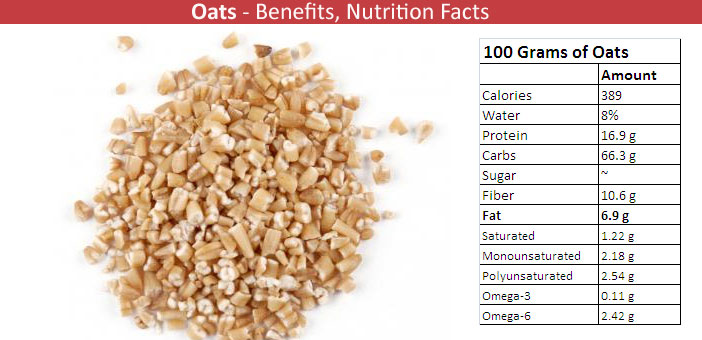
According to a study conducted by the University of Manitoba, oats contain rich amounts of beta-glucan that help lower blood cholesterol levels and blood pressure. Thus, it eventually helps in shielding your heart. Oats are a good source of fiber, which makes it beneficial for your digestive system and enables you to lose excess weight. Studies suggest that people who eat oatmeal three to five times a week have about 5% fewer chances of developing heart attacks.
How to eat: Never buy Oats with added flavorings, primarily the one that comes with sugar. This hides the nutrients and adds extra calories to your diet. Dteel-cut oats are best to have for breakfast. Soak it in water overnight, cook it in the morning, and have a healthy whole grain chewy breakfast. One could also have raw with warm milk that retains all the nutrients. Avoid adding too much sugar. Oatmeal bread is good in taste and could be a good option for people who do not like the taste of it in milk. One could take Oats with egg white, which adds required proteins to the diet, too, while aiding in weight loss.
Benefits of Oats
- Cholesterol – Beta-glucan present in oatmeal helps lower cholesterol levels. A bowl of oatmeal every day helps lower the levels by 8-23%
- Cardiovascular Disease – Due to being high in fiber and rich in antioxidants, oatmeal helps to remove cholesterol from the digestive system, thus reducing the risk of cardiovascular disease
- Heart Attack – According to research by Harvard Medical School & Brigham and Women’s Hospital, eating whole grain products lowers the risk of heart attack by 29%
- Immune System – Due to the presence of Beta-glucan in Oats, having it regularly enhances the immune system, primarily its response to bacterial infections
- Diabetes – In place of rice or normal bread, having oatmeal as breakfast has beneficial effects on type 2 diabetes patients. It also lowers the risk of type 2 diabetes
- Breast Cancer – For pre-menopausal women, taking this cereal could significantly lower the list of breast cancer
3. Pistachios
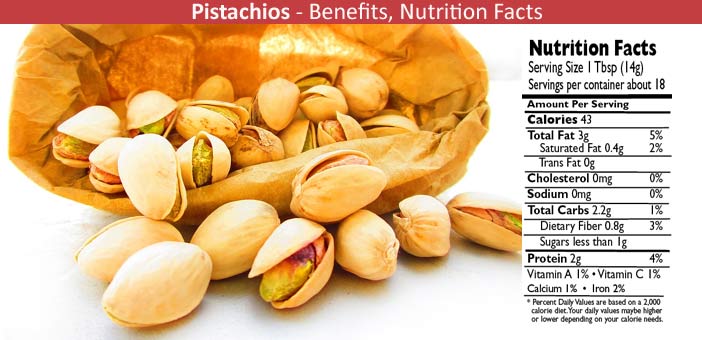
Pistachios contain the lowest levels of fats among all the nuts. They are chock a block with omega-3 fatty acids and protein. While the former helps keep your heart healthy, protein aids in weight loss. One serving of pistachio – about 49 nuts – yields 3 grams of fiber, 11 grams of fat, and 6 grams of protein. It helps in lowering the levels of cholesterol and is beneficial for the sexual health of men.
Pistachios are great for metabolic health issues like obesity and diabetes, and helps with heart health. Pistachios have less of fat and calories. It is rich in unsaturated fats and antioxidants that have anti-inflammatory benefits. It contains xanthophyll carotenoids, potassium, γ-tocopherol, and phytosterols. (Source)
How to eat – The best way to eat pistachio is in the raw state after breaking its shell. It comes in semi-opened shapes as well as in closed bodies. The secure shell is tough to crack, comes cheap, and is sometimes organic.
Benefits of Pistachios
- Heart disease – Regular pistachio intake helps in lowering bad LDL cholesterol in the body. l-arginine presence in the nut helps in making the lining of arteries flexible, thus preventing blood clots that could lead to heart attack
- Weight loss – Due to its high in fiber, eating pistachio could mean more filling with fewer calories, thus an ideal snack whenever you feel like eating anything between meals
- Immune system – It is an ideal immune booster due to its high of Vitamin B6, an element which is responsible for the smooth functioning of the immune system. Due to the significant level of antioxidants, the nut also helps in fighting microbial diseases
4. Yogurt
Time again, yogurt makes it to the top of the healthiest foods list. One serving of yogurt is sufficient to meet the recommended daily dose of calcium. It also contains probiotics, the good bacteria essential to preserve your gut’s healthy environment and keep your gastrointestinal tract healthy. Yogurt also keeps you fuller for prolonged hours, thus aiding you in weight loss. Since it has probiotic bacteria, it also helps ease digestive issues. Studies even suggest that regular intake of yogurt could save you from cancer.
Yogurt is rich in nutrients like calcium, zinc, and B vitamins. It is very good and healthy addition to diet primarily for older adults. It helps address age-related nutritional gaps. It also helps with health issues like bone weakness and heart problems. It is rich in vitamin D with extra probiotics. (Source)
5. Beans
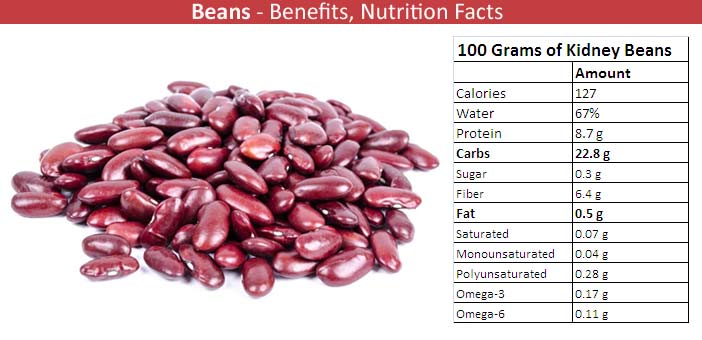
Beans are a good source of soluble fiber that soaks up the bad cholesterol and disposes of it before they form arterial wall deposits. Beans are also rich sources of some of the most potent antioxidants that help eliminate the free radicals that otherwise could induce oxidative damage. Eat them with your pasta or porridge, or toss them into your salads for protein.
Cardiovascular disease is one of the major global disease which kills millions every year. It is directly linked with other conditions like obesity and type-2 diabetes. In the U.S. 42% of adults and 18.5% of youth are obese. Diet is pne of the key factor. The diet can be modified to manage these conditions. Beans offer benefits like weight control and reduced inflammation. This improves heart health and immune function. They especially help in managing obesity-related complications and enhancing overall well-being. (Source)
6. Cruciferous Vegetables
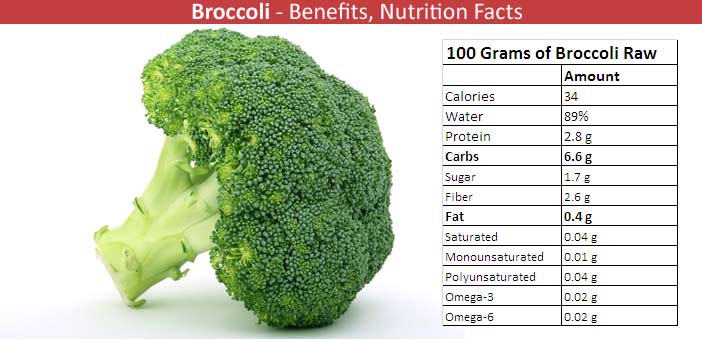
Cruciferous veggies like cabbage, broccoli, and cauliflower are rich in fiber, low in calories, and packed with countless powerful nutrients. They also contain various antioxidants that help lower oxidative damage and stimulate the enzymes that could combat the carcinogens. According to a study, people with at least five servings of cruciferous veggies had less than a 50% chance of developing cancer.
Being rich in fiber, they also help manage your cholesterol levels, lower blood pressure levels, improve your metabolism, keep your digestive tract healthy, ease constipation, and aid in weight loss.
7. Eggs
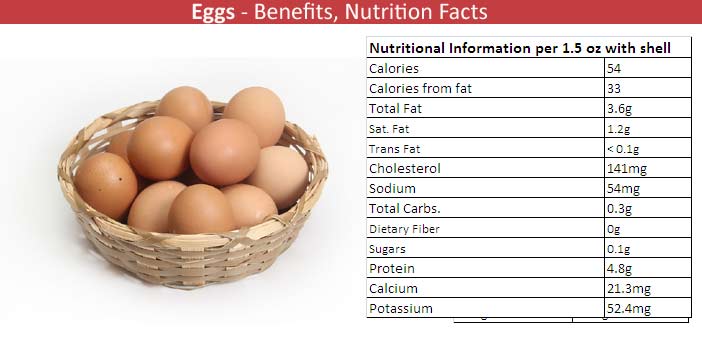
Eggs are well known for their rich, quality protein. They keep you packed up for a longer time, thus ensuring you do not yield to undesirable cravings throughout the day. Eggs contain choline, a compound that is beneficial for brain health. Eggs contain vitamin B2, vitamin B6, vitamin B12, vitamins A, D, and K, folate, essential fatty acids, phosphorous, selenium, calcium, and zinc, making it a super food in all senses.
Benefits of Eggs
- Dietary Cholesterol and Heart Disease: Dietary cholesterol is no longer viewed as a risk for heart disease, elevating the value of eggs for their other nutritional benefits.
- High-Quality Protein Source: Egg protein is highly digestible and rich in essential amino acids, making it an excellent source of protein.
- Combatting Malnutrition: The protein from eggs helps alleviate malnutrition in underdeveloped countries and promotes height growth in children.
- Nutritious – Eggs are ranked among some of the most nutritious foods in the world. An egg gives out 77 calories, of which 5 grams are healthy fats and 6gms of protein
- Raises good cholesterol – Egg helps in raising the density of Lipoprotein or HDL, which in turn lowers the risk of stroke and heart disease. 2 eggs/day for six weeks could help in increasing the HDL levels by 10%
- Antioxidants – Lutein and Zeaxanthin present in egg yolks help in reducing the chances of getting cataracts and help in building strong retina
- Muscle Health and Sarcopenia: The protein in eggs supports muscle health and helps with protection against age-related muscle loss, known as sarcopenia.
- Protective Health Benefits: Egg protein offers additional protective effects, like resistance to infection and potential anti-cancer and blood pressure-lowering properties.
(Source)
8. Bananas
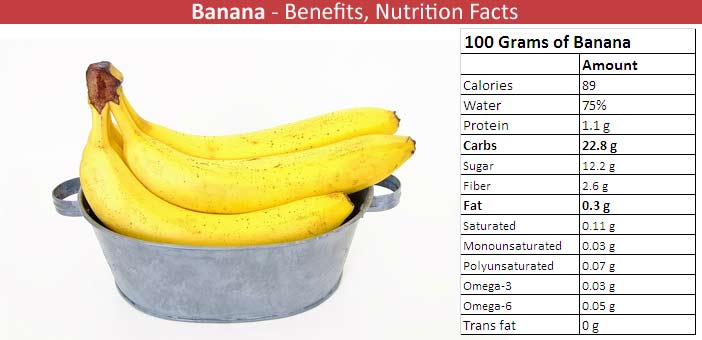
These yellow-skinned foods are one of the best post-workout snacks. Densely packed with potassium, bananas help lower blood pressure levels and prevent stroke. Bananas are also beneficial for the sexual health of men. The rich presence of fiber makes it a good solution for constipation and diarrhea. It aids in weight loss, maintains the rhythm of your heartbeat, helps manage stress and depression, protects your eyes from macular degeneration, averts the risk of kidney cancer, offers protection from free radical damage, and so on.
How to eat: The best way to eat a banana is in its raw state. Eat it bite by bite, peeling it after each slice. One could also take it after making a smoothie by blending it with milk or yogurt.
Benefits of Bananas
- Blood Sugar – Pectin and resistant starch present in bananas help in moderating blood sugar levels and delay the emptying of the stomach. However, people with diabetes should monitor their sugar levels by consuming too many ripe bananas
- Digestion – A ripe banana contains 3gms of fiber. These dietary fibers help in improved digestion
- Weight loss – The fruit cannot be linked directly with weight loss. However, the filling property and low-calorie content could delay hunger and give a sense of fullness, which could help in weight loss
- Heart – One ripe banana has nearly 9% of RDI. Its high potassium content makes it an ideal food for lowering high blood pressure. Healthy people who take a high potassium diet have a 27% less chance of heart disease
- Antioxidants – Like other fruits, bananas are rich in antioxidants and contain catechins and dopamine. These antioxidants help in delaying heart diseases
9. Dark Leafy Greens
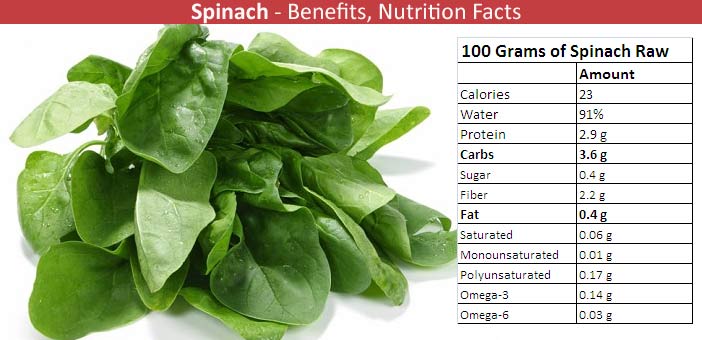
Dark leafy greens like spinach and fenugreek leaves are rich in fiber, calcium, iron, potassium, and magnesium. They also contain a good dose of omega-3 essential fatty acids and vitamins like A, C, and K. A good source of protein and fiber for vegans and vegetarians, dark leafy greens are treasure troves of antioxidants. They keep you full and prevent the sugar levels from fluctuating, thus enabling them to benefit those on a weight loss regimen and diabetes.
They contain kaempferol, a flavonoid that helps lower cancer risk. The inclusion of antioxidant-rich dark leafy greens in your diet could reduce the risk of age-related cognitive decline and conditions like Alzheimer’s Disease. They also contain good doses of iron that are beneficial for your brain and prevent anemia. The vitamin K in these veggie leaves prevents age-related diseases and keeps you younger. It lowers the levels of cholesterol and shields your heart. Being rich in fiber helps ease constipation and keep your digestive system more robust.
10. Oranges
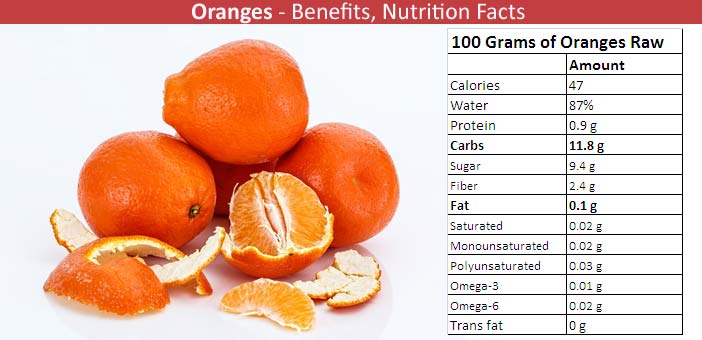
Last but not least, these tangy and sweet citrus fruits are excellent foods to be enjoyed daily. Just one orange a day is sufficient to meet your recommended daily allowance of vitamin C. Oranges are rich in folate and fiber, making them beneficial for your weight loss and digestive system. Vitamin C is one of the most potent antioxidants that free you from the damage induced by free radicals. Thus, oranges could shield you from the risk of cancer. They also help in detoxification, thereby strengthening your liver and digestive system.
Oranges are also beneficial for the skin as they help cleanse the system from within, thereby delaying the onset of aging signs.
The list of foods to include in your diet daily is, in fact, vast. But taking baby steps is always the best to build an empire strong. So start today and make a difference!
Conclusion
Incorporating flax seeds, oats, pistachios, and other nutrient-rich foods into your daily diet significantly enhances your health. These foods offer a myriad of benefits, from lowering cholesterol to boosting the immune system. Starting with small, manageable changes can lead to substantial improvements in your overall well-being. Embrace these dietary adjustments to build a stronger, healthier future.
